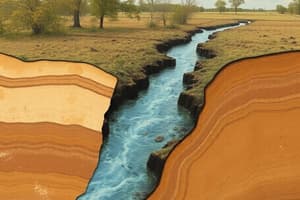Podcast
Questions and Answers
Soil conservation practices aim to increase soil erosion and sedimentation.
Soil conservation practices aim to increase soil erosion and sedimentation.
False (B)
Water conservation is not important in maintaining soil fertility.
Water conservation is not important in maintaining soil fertility.
False (B)
Managing soil erosion is not a part of soil conservation practices.
Managing soil erosion is not a part of soil conservation practices.
False (B)
Using land based on its capability is unnecessary for effective soil and water conservation.
Using land based on its capability is unnecessary for effective soil and water conservation.
Scientific soil and water conservation measures aim to reduce bio-chemical contamination of soil and water.
Scientific soil and water conservation measures aim to reduce bio-chemical contamination of soil and water.
Livestock overgrazing is one of the causes of soil degradation.
Livestock overgrazing is one of the causes of soil degradation.
Deforestation is not a factor in causing soil degradation.
Deforestation is not a factor in causing soil degradation.
The largest use of withdrawn water is for agriculture.
The largest use of withdrawn water is for agriculture.
Deserts are irrigated, leading to a decrease in the need for water in those areas.
Deserts are irrigated, leading to a decrease in the need for water in those areas.
Soil conservation aims to disrupt the natural functions of the soil to enhance plant growth.
Soil conservation aims to disrupt the natural functions of the soil to enhance plant growth.
Using fertilizers extensively can contribute to soil degradation.
Using fertilizers extensively can contribute to soil degradation.
Soils have been overlooked throughout history, to the benefit of civilizations.
Soils have been overlooked throughout history, to the benefit of civilizations.
Soils can serve as a filter for water.
Soils can serve as a filter for water.
According to Franklin D. Roosevelt, forests play a role in purifying the air.
According to Franklin D. Roosevelt, forests play a role in purifying the air.
Hugh Hammond Bennett believed that taking care of the land will not have any impact on people.
Hugh Hammond Bennett believed that taking care of the land will not have any impact on people.
John F. believes that solving water problems is only deserving of one Nobel prize.
John F. believes that solving water problems is only deserving of one Nobel prize.
Soils play a role in regulating air quality.
Soils play a role in regulating air quality.
Flashcards are hidden until you start studying
Study Notes
Soil and Water Conservation
- Soil and water conservation involves controlling erosion and maintaining soil fertility while wisely using water to meet essential demands.
Importance of Soil and Water Conservation
- Soil and water conservation is crucial, especially in the current situation where there is increased pressure on soil and water resources to fulfill human needs and ensure food security.
Causes of Soil Degradation
- Livestock overgrazing, deforestation, and cropland agriculture are the main causes of soil degradation.
Functions of Water
- Agriculture is the largest use of withdrawn water, with 13% being consumptive use.
- Industrial use of water can be the largest use in highly industrialized nations, with both consumptive and recycled water being used.
- Municipal use of water is also consumptive and recycled back to surface waters.
- Wildlife and recreation are also important uses of water, with economically important utilization of stored water.
Pressure on Soil and Water Resources
- Increasing population and standards of living lead to:
- Deforestation and urbanization, resulting in land degradation.
- Irrigation of deserts, increasing water demand.
- Extensive plowing and fertilizer use, enhancing land degradation.
Soil Conservation
- Soil conservation means maintaining the functions of the soil to sustain plant growth.
- It involves managing soil erosion, reducing sedimentation, and exploiting new opportunities.
Importance of Soil
- Soils are critical to the human condition, providing for food, fiber, fuel, and feed production.
- Soils have various urban uses, regulate water flow, serve as a filter for water, and regulate air quality.
- Soils are involved in regulating the terrestrial water cycle and serve as a sink for CO2 and CH4.
Impacts of Soil Management
- Soil management affects water availability, water quality, and air quality.
- It influences runoff, drainage, evapotranspiration, and the terrestrial water cycle.
Studying That Suits You
Use AI to generate personalized quizzes and flashcards to suit your learning preferences.




